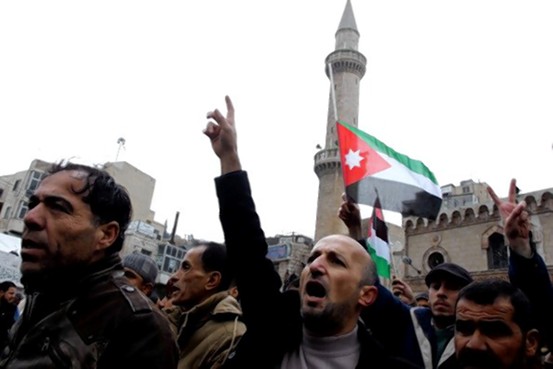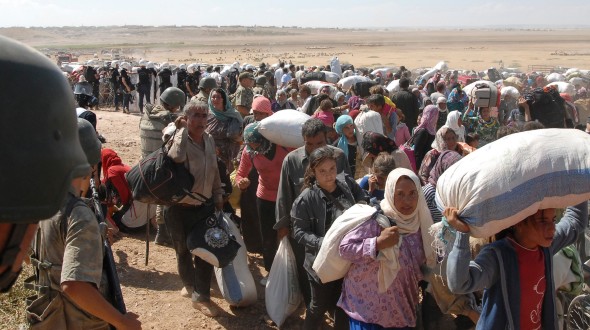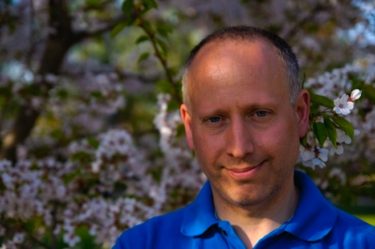News from Jordan, Turkey and Russia
Tuesday's World Events — Posted on September 23, 2014

Anti-government protesters outside the al-Husseini mosque during demonstrations in Amman in January. (Getty Images)
JORDAN – Jordan Plans Crackdown on Unauthorized Mosques to Combat Radical Islam
AMMAN — In a new push to combat radical Islam, Jordanian authorities are developing plans to crack down on the construction of thousands of unauthorized mosques and to place government-appointed imams in their pulpits [minbar].
Of 8,600 mosques in U.S.-allied Jordan – most of them illegally built – 4,500 are led by preachers, or imams, who aren’t appointed by the government, according to official figures.
Imams at legal mosques are selected and paid by the government, one of the ways religious life in Jordan is heavily controlled by the state. As government employees, they are expected to renounce jihadist ideology and rally support for the monarchy during Friday prayers, imams said. The Jordanian government monitors and disseminates suggested weekly sermons to imams on its payroll and instructs them on what to talk to congregations about, and what not to talk about.
With public spaces scarce and also tightly controlled by authorities, mosques are the main gathering places for communities across the small kingdom of about eight million people. But Jamal al-Batayneh, who administers the province of Zarqa for the Ministry of Religious Affairs, said they can also become incubators of radicalism.
Authorities [say] that some [unauthorized] imams [promote/endorse] violence.
To pre-empt construction of unauthorized mosques, officials are hoping to persuade neighborhood leaders to build schools, orphanages or gardens instead. They also want to replace the thousands of unauthorized imams with government-appointed imams, something officials acknowledge will be difficult to do, in part because of a lack of funds.
The country’s intelligence network can’t keep up with the estimated 400 to 500 illegal mosques that are built each year with self-appointed imams the government deems unqualified.
Jordan’s latest effort to combat radical Muslims coincides with a regional [agreement] reached last week at a meeting in Jeddah, Saudi Arabia. Jordan, Lebanon, Egypt, Iraq and representatives of the Persian Gulf bloc of Sunni states, after meeting with U.S. Secretary of State John Kerry, promised to take military measures against extremist group Islamic State and tackle its “hateful ideology.”
Mr. Kerry is leading diplomatic efforts to build an international coalition against Islamic State, which has captured large tracts of land in both Iraq and neighboring Syria since June. …
The Jordanian government’s plan to regulate mosques is just the latest attempt to stem radical Islam. The kingdom has long relied on an extensive intelligence network to identify and quash suspected extremists.
 Efforts by authorities to control the messages disseminated in mosques are focused on poverty-stricken areas outside Amman, such as the northern city of Zarqa, a longtime extremist stronghold. The city is the birthplace of the late Abu Musab al-Zarqawi, who founded al Qaeda in Iraq – a precursor of Islamic State – before he was killed by U.S. forces in 2006.
Efforts by authorities to control the messages disseminated in mosques are focused on poverty-stricken areas outside Amman, such as the northern city of Zarqa, a longtime extremist stronghold. The city is the birthplace of the late Abu Musab al-Zarqawi, who founded al Qaeda in Iraq – a precursor of Islamic State – before he was killed by U.S. forces in 2006.
Zarqa was a popular jumping-off point for militants going to fight American forces in Iraq in 2003 and it has contributed fighters to the Syrian civil war. The city teems with mosques – an estimated 300, about 80% of them illegally built—that compete for the attention and loyalty of the city’s estimated 700,000 people. The number of mosques is almost double the number of public schools, making them the center of community life.
TURKEY – About 60,000 130,000 Syrian Kurds flee to Turkey from Islamic State advance
SURUC, TURKEY — About 60,000* Syrian Kurds fled into Turkey in the space of 24 hours, a deputy prime minister said on Saturday, as Islamic State militants seized dozens of villages close to the border. [*NOTE: By mid-afternoon Monday, the number of Kurds who have fled over the border into Syria to escape ISIS terrorists reached 130,000 people.]

Turkish soldiers stand guard as Syrian Kurds cross the border fence into Turkey near the southeastern town of Suruc province. (Reuters)
Turkey opened a stretch of the frontier on Friday after Kurdish civilians fled their homes, fearing an imminent attack on the border town of Ayn al-Arab, also known as Kobani. A Kurdish commander on the ground said Islamic State had advanced to within 9 miles of the town.
Local Kurds said they feared a massacre in Kobani, whose strategic location has been blocking the radical Sunni Muslim militants from consolidating their gains across northern Syria.
The United States has said it is prepared to carry out airstrikes in Syria to stop the advances of Islamic State, which has also seized tracts of territory in neighbouring Iraq and has proclaimed a caliphate in the heart of the Middle East.
U.S. forces have bombed the group in Iraq at the request of the government, but it is unclear when or where any military action might take place in Syria, whose president, Bashar al-Assad, Washington says is no longer legitimate.
 Lokman Isa, a 34-year-old farmer, said he had fled with his family and about 30 other families after heavily armed Islamic State militants entered his village of Celebi. He said the Kurdish forces battling them had only light weapons.
Lokman Isa, a 34-year-old farmer, said he had fled with his family and about 30 other families after heavily armed Islamic State militants entered his village of Celebi. He said the Kurdish forces battling them had only light weapons.
“They (Islamic State) have destroyed every place they have gone to. We saw what they did in Iraq — in Sinjar — and we fled in fear,” he told Reuters in the Turkish town of Suruc, where Turkish authorities were setting up a camp.
Sitting in a field after just crossing the border, Abdullah Shiran, a 24-year-old engineer, recounted scenes of horror in his village of Shiran, about six miles from Kobani.
“IS came and attacked and we left with the women but the rest of the men stayed behind … They killed many people in the villages, cutting their throats. We were terrified that they would cut our throats too,” he said.
RUSSIA – BBC Journalists Attacked Investigating Servicemen Deaths in Russia
MOSCOW — The British Broadcasting Corp. (BBC) said unidentified men attacked a team of its journalists and destroyed their camera as it was investigating reports of Russian servicemen being killed near the border with Ukraine.
 The public-funded broadcaster said its staff were badly beaten by at least three assailants in the southern Russian city of Astrakhan on Tuesday. After four hours of questioning at a local police station afterward, the journalists discovered that their recording equipment, which had been in their vehicle at the police station, had been electronically wiped, the BBC said in a statement.
The public-funded broadcaster said its staff were badly beaten by at least three assailants in the southern Russian city of Astrakhan on Tuesday. After four hours of questioning at a local police station afterward, the journalists discovered that their recording equipment, which had been in their vehicle at the police station, had been electronically wiped, the BBC said in a statement.
“The attack on our staff, and the destruction of their equipment and recordings, were clearly part of a coordinated attempt to stop accredited news journalists reporting a legitimate news story,” the BBC said.
The attack comes amid rising pressure on news media whose reporting has been at odds with the Kremlin’s narrative of events in the region. Before the attack, BBC Moscow Correspondent Steven Rosenberg and two colleagues had interviewed the sister of a Russian serviceman who died in August after telling his family he was being sent to southeastern Ukraine, according to an article written by Mr. Rosenberg and published on the BBC website Thursday.
Moscow says its forces aren’t involved in the conflict between pro-Russia rebels and government forces in eastern Ukraine. But officials in Moscow recently said some Russian volunteers, as well as army personnel on vacation, are fighting there.

Steve Rosenberg of the BBC. (Steve Rosenberg / Twitter)
Attacks on foreign journalists in Russia are rare, but beatings and killings of local reporters occur more frequently. Russian journalists investigating the presence of Russian soldiers fighting in Ukraine have faced attacks by unknown assailants recently.
Western and Ukrainian officials say Russian army units are fighting in eastern Ukraine. Russian journalists have published several investigations into the claims, which appear to show servicemen were there.
Lev Shlosberg, a local lawmaker and journalist in the western city of Pskov, was badly beaten in August after publishing a story about the funerals of paratroopers from a local regiment who were apparently killed in Ukraine. Television and newspaper reporters who went to the cemetery near Pskov were also attacked by unidentified men.
According to the BBC article on Thursday, as the BBC team was leaving the sister’s village in southern Russia, their car was stopped by traffic police, who checked their trunk and identities, he wrote. After lunching in Astrakhan some 40 miles away, the journalists were confronted and attacked by at least three people.
The assailants knocked the cameraman to the ground and beat him, smashing the camera and taking it away in their car, Mr. Rosenberg wrote. The cameraman suffered a concussion, but all three are now safe and back in Moscow, a BBC spokesman said.
After four hours of questioning at a police station, the journalists discovered that their recording equipment, which was in their vehicle at the police station, had been wiped, the BBC said in a statement.
Russian police said it had opened a criminal case into the incident. Pyotr Rusanov, a spokesman for Astrakhan regional police, said a large police team was searching for the suspects and the camera. “We haven’t managed to detain anyone yet. We’re working on it,” he said by telephone. The BBC on Thursday submitted a complaint to the Russian Foreign Ministry about the attack, the BBC spokesman said. The Foreign Ministry didn’t have an immediate comment. …
(The news briefs above are from wire reports and staff reports posted at The Wall Street Journal on Sept. 19, Reuters and The Wall Street Journal on Sept. 18.)
Background
JORDAN
- Heading off the construction of unauthorized mosques has proved a daunting and delicate challenge for Jordan's government. Once they are built, it is difficult to impossible to remove them, Jamal al-Batayneh, who administers the province of Zarqa for the Ministry of Religious Affairs said.
- "If a citizen builds an apartment, the municipality will stop them. But when they build a mosque, you can't say no. And if the government bulldozed a mosque, there would be an uproar," he said.
- The Ministry of Religious Affairs also faces problems in funding the anti-radicalization program, which Mr. al-Batayneh estimates will need $70 million to be effective. The government is about $27 billion in debt and a freeze on hiring public-sector employees has been in place since 2010.
- The program to combat radicalism was approved in August. But after the Jeddah meeting, Jordanian officials are hoping to expand it and get funding from the U.S. or Saudi Arabia.
- Some see the attempts to regulate unauthorized mosques and other anti-radicalization efforts as too little too late. They say measures should have been put in place after three hotels were bombed in downtown Amman in 2005 - coordinated attacks believed to have been masterminded by Zarqawi.
- In April, Jordan tightened its antiterrorism laws out of concern for the swelling numbers of Jordanians and foreigners making their way to neighboring Syria's civil war. Government media reported this week that eight Jordanians would stand trial for joining Islamic State and for spreading radical ideology on the Internet.
- One senior official in Amman estimated 1,500 Jordanians have gone to fight in Syria since the start of the uprising against President Bashar al-Assad in March 2011.
- The government, for its part, is deeply involved in the civil war, helping train and arm moderate anti-Assad rebels in close cooperation with the U.S.
- As he awaits government funds to fight radicalization, Mr. Batayneh holds workshops in Zarqa to promote moderate Islam and drives around the city keeping records of mosques under construction. He spends his monthly government stipend for gas in days and pays for it himself after that.
- "Jordan is the leading moderate country in the Middle East and it must remain this way," he said. "The wall is collapsing, and we are all struggling to hold it upright." (from the Wall Street Journal article above)
TURKEY
- Turkish soldiers looked on as the refugees, many of them women carrying bundles on their heads, streamed across. Hundreds of people huddled in the dusty fields with their few belongings.
- Turkish Deputy Prime Minister Numan Kurtulmus put the number of Syrian Kurds to have crossed the 30-km section of the border that has been open since Friday at 60,000. Officials said many thousands were still waiting to cross on Saturday evening.
- "The United States, Turkey, Russia, friendly countries must help us. They must bomb Islamic State. All they can do is cut off heads, they have nothing to do with Islam," said Mustafa Saleh, a 30-year-old water industry worker. "I would have fought to my last drop of blood against Islamic State, but I had to bring the women and children."
- Kurdish forces have evacuated at least 100 villages on the Syrian side since the militants' onslaught started on Tuesday.
- "Islamic State sees Kobani like a lump in the body, they think it is in their way," said Rami Abdulrahman, who runs the Syrian Observatory for Human Rights, which monitors Syria's civil war. Islamic State has executed at least 11 Kurdish civilians, including boys, in the villages it has seized near Kobani, the Observatory said.
- Abdulrahman said more than 300 Kurdish fighters had crossed into Syria from Turkey late on Friday to help push back Islamic State, but that it was not clear which group they belonged to.
- "Islamic State is killing any civilian it finds in a village," Mustefa Ebdi, director of a local radio station called Arta FM, told Reuters by telephone from the northern outskirts of Kobani. He said he could see thousands of people waiting to cross the border into Turkey. "People prefer to flee rather than remain and die," he said. "(Islamic State wants) to eliminate anything that is Kurdish. This is creating a state of terror."
- On his Facebook page, Ebdi said the killing of 34 civilians - women, elderly, children and the disabled - had been documented. He said the residents of 200 villages had been forced to flee.
- Iraqi Kurdish leader Masoud Barzani called on Friday for international intervention to protect Kobani from the Islamic State advance, saying the insurgents must be "hit and destroyed wherever they are."
- Western states have increased contact with the main Syrian Kurdish political party, the PYD, whose armed wing is the YPG, since Islamic State made a lightning advance across northern Iraq in June.
- The YPG says it has 50,000 fighters and should be a natural partner in the coalition the United States is trying to build.
- But such cooperation could prove difficult because of Syrian Kurds' ties to the Kurdistan Workers' Party (PKK), a group listed as a terrorist organisation by many Western states due to the militant campaign it has waged for Kurdish rights in Turkey.
- The PKK on Thursday called on young men in Turkey's mainly Kurdish southeast to join the fight against Islamic State. On Saturday Kobani's local radio station broadcast a call to arms from PKK commander Murat Karayilan in Kurdish. (from the Reuters article above)
RUSSIA
- The Organization for Security and Cooperation in Europe condemned the attack. The OSCE's representative on media freedom, Dunja Mijatovic condemned the "growing violence" against journalists in Russia, noting in a statement that it was the latest in a spate of attacks against reporters investigating the conflict in eastern Ukraine.
- In a sign that a further wave of pressure on the media could soon hit, the speaker of Russia's lower house of parliament indicated his support for a draft bill that would ban foreign companies from owning more than a 20% stake in Russian media.
- Currently, foreign companies can own no more than 50% of television or radio stations. Foreigners need government permission to buy stakes in TV and radio stations, as well as print publications with circulations of more than one million.
- The law, if passed, could affect a number of channels and publications. Vedomosti, a business daily, is co-owned by Finnish media group Sanoma, the Financial Times Group and Dow Jones & Co., publisher of The Wall Street Journal. CTC Media, which runs several TV channels, is part-owned by Sweden's Modern Times Group. German publisher Axel Springer owns Forbes magazine and website in Russia.
- "It is international practice, normal practice, for national legislation to protect its market," Mr. Naryshkin? told reporters, Interfax news agency reported. "The aim is clear: to protect national sovereignty." (from the wsj article above)
